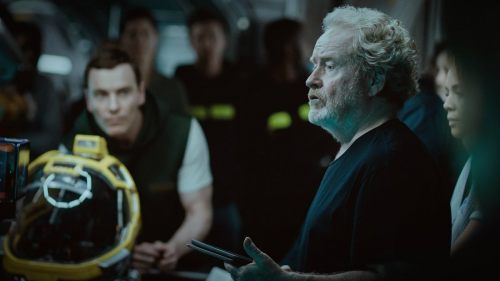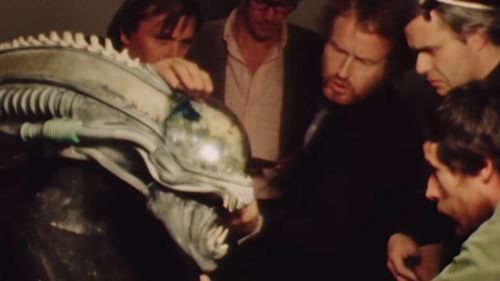Why Ridley Scott Decided To Replace Kevin Spacey In ALL THE MONEY IN THE WORLD
We give Ridley Scott a lot of shit. Many didn't love (or even like) his last Alien picture (though I'll always champion it as one of the year's unheralded masterworks), and he often has a way of putting the cart before the horse when it comes to franchise filmmaking (remember when he said he was going to make five more of those things at one point?). But he's also a superior artist in the midst of his twilight years (the man turns eighty tomorrow, for Christ's sake), who seems to be wrestling with his own legacy and will probably die in the director's chair.
Recently, Scott made huge headlines by replacing known sexual predator Kevin Spacey (whose mounting list of violations is truly awful) with Christopher Plummer in his upcoming awards season true crime melodrama All the Money In the World. It seemed like an impossible task when first announced - even if Spacey's time on the picture only amounted to ten days of shooting - both expensive and seemingly fool-hearted when combined with the notion All the Money was still aiming for release on December 22nd...of this year.
For those unfamiliar with the timeline, on October 29th, actor Anthony Rapp (Star Trek: Discovery, Rent) accused Spacey of making a sexual advance toward him when Rapp was fourteen years old (at the time, Spacey was twenty-six, and has since apolgized via an ill-conceived statement where the performer officially came out as a gay man). Since then, more than a dozen men have alleged similar sexual misconduct or assault. In response, Scott made the radical announcement to scrub Spacey from the film. On November 8th, he stated that he would reshoot all of Spacey’s scenes, replacing him with Christopher Plummer, and still make the December release date. This meant securing original locations and getting key actors, including Michelle Williams and Mark Wahlberg, back in front of the camera in London and Rome for ten days, including the Thanksgiving holiday.
However, Scott has apparently pulled off what everybody thought he couldn't. Though the director only started re-shooting Spacey’s scenes with Plummer on November 20th, the new cut of All the Money In the World is reportedly finished, with press screenings being scheduled across the country (this writer's review invite arrived in his inbox today). That's a mind-blowing turn-around time, especially given the picture was pretty much in the can when Scott received word of Spacey's crimes. But now there's even a new teaser to prove it:
Nevertheless, the real story isn't how Scott reshot All the Money In the World*, but rather the "why" behind his actions. Speaking with EW, Scott described how he came to the decision:
“There’s no time for pondering. Sometimes you’ve got to lay down the law. You have to!”
Scott delivered this answer with a grin to interviewer Sarah Vilkomerson, but was deadly serious about taking swift action to ensure his and other artists' efforts on All the Money weren't lost due to a single individual's terrible decisions:
"I was finished with the film and was in [U.K. recording studio] Abbey Road finalizing the music. Someone was like: Guess what? And that’s where it began. I sat and thought about it and realized, we cannot. You can’t tolerate any kind of behavior like that. And it will affect the film. We cannot let one person’s action affect the good work of all these other people. It’s that simple."
Beyond having steadfast morality built into his words, Scott also keys in on one element of cinema that gets lost in many conversations surrounding the medium: it's a collaborative art. Had Scott and the production companies not embarked on this campaign (which reportedly cost an extra $10 million), the movie would've likely been shelved, never to be released (or quietly dumped with barely any PR push). This meant that any merit the other above or below the line talent provided could've been lost or mostly ignored. Spacey is not bigger than the rest of All the Money In the World, and it's clear Scott put his own cash where his mouth is (as he paid for at least part of the reshoots from his own pocket) to make sure that message was delivered.
Scott also tossed any common courtesy shown toward Spacey out the window, letting the actor find out about the reshoots the same way Scott's crew (and the rest of us) were told about his crimes: through the press.
"...he didn’t call me. If he had called me and said, 'Hey, look, this is the way it is and I’m really sorry,' then I’d have handled it slightly differently."
However, Scott admits that, had Spacey been forthcoming regarding the crimes and informed the production, the director would've made the same choice:
"I’d have still done it. I would have said, 'Yes, thank you for calling, but I have to move on.'"
"...but I have to move on." Those may be the most important words contained in this conversation. While we can debate the morality of scrubbing an individual's work after its complete, the simple fact remains that letting Spacey's performance stand and be consumed by audience members sends a shaky signal to not only viewers at home, but the industry at large. It says "what can we do? We still need to sell our product, even if it promotes the work of a criminal." The creative team behind All the Money In the World wouldn't stand for that, and their actions serve as a sharp, no nonsense counter to those larger productions who continue to employ and implicitly condone the acts of known abusers.
This is no time or place for shitty men. Ridley Scott knows it, and being the titan of cinema that he is, used the platform he's been graced with (and worked his whole life to produce fine commercial art within) for a greater service. Whether or not the movie turns out to be any good is for another discussion entirely. This is a moment to be celebrated, as a legendary director fired a shot across the bow, signaling that Hollywood should not be a haven for those looking to hurt or exploit other human beings. While many will discuss Alien and Blade Runner long after Ridley's passed, this act will serve as a fairly sizable footnote to an already storied career.
*Short answer: digital cinema is easier to fix in post than celluloid.



